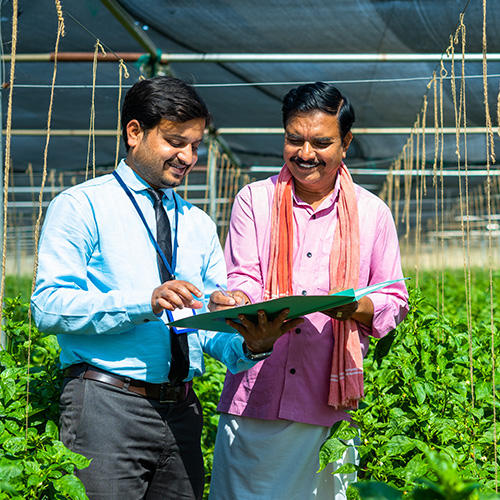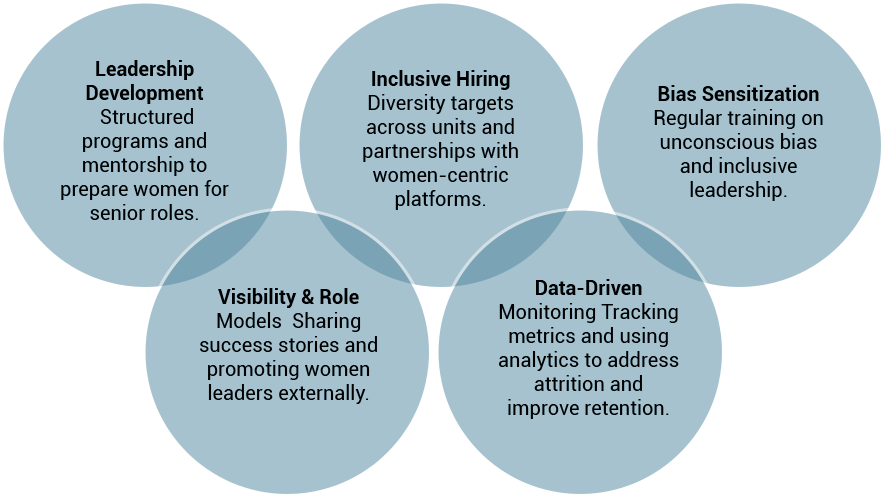Breadcrumbs
- Home
- Sustainability Framework
Responsible Banking
Sustainability Framework
RBL Bank has made a strategic commitment to sustainable development, which is led by the board and senior management. This signifies the bank's dedication in incorporating sustainable practices into its operations and decision-making processes.
| Managing Bank’s own E&S footprint | Managing E&S footprint and impact of RBL Bank’s lending and investments | Financial Inclusion (FI) and Financial Literacy (FL) |
| Energy efficiency in offices and branches | - Exclusion criteria as per IFC Performance Standards - E&S risk assessment of eligible wholesale loans |
FI products like microfinance, micro-banking & no-frills accounts, insurance etc. |
| Green Building certified offices |
- Thresholds are defined to contain exposure to “high carbon-emitting” industries |
FL trainings with partners in rural and semi-rural areas with focus on: |
| Switch to renewable energy and solar rooftops | Monitoring impact and reporting through Integrated Annual Report | Impact - positive impact on livelihood and financial choices among the beneficiaries |
-
The Bank adopted its first board-approved Sustainability Policy, as early as Jun 2013 (Board approved).
-
Established an ESG Committee as early as FY16, which is chaired by the ED, who is a member of the Bank’s Board since inception. The ED spearheads ESG and climate risk related activities of the Bank. All this was done well in advance before BRSR requirements, which was made mandatory only in 2021.
-
The committee also includes an external representative from IFC (International Finance Corporation).
The major areas of emphasis and initiatives under the Sustainability Policy are as follows:
-
Board-level oversight – executed through quarterly updates
-
ESG committee with representation from Executive Director and even external representatives (which helped the Bank to adopt global best practices)
-
Quarterly reviews by the ESG Committee
-
The Bank has adopted “Environmental and Social Risk Management Framework (ESMS)” based on the IFC’s performance standards
-
Each qualifying transaction is reviewed by a dedicated E&S risk specialist
-
Sustainable finance products are offered and often financed through climate-smart credit lines from DFIs
-
Active partner in financing public transport e-mobility projects (electric buses)
-
Financial inclusion financing and digital financial literacy through Business Correspondent partners
-
Target to increase women in our workplace to 30% by 2027
-
In order to achieve the gender diversity goal, the bank broadly focuses on “Leadership Development”, “Inclusive Hiring”, “Bias Sensitization”, “Visibility & Role Models” and “Data-Driven Monitoring”
-
Integrated E&S assessment into sanctioning of qualifying loans since 2015
-
Added Climate Risk assessment effective 2020, much ahead of RBI’s guidance on climate risk management.
-
-
Supporter of Task Force on Climate related Financial Disclosures (TCFD) since August 2022
-
Board-approved portfolio level exposure caps to “high carbon-emitting” industries (October 2024)
-
Board-approved Coal Policy adopted (Q2 FY24)
-
Bank filed responses to CDP [earlier known as 'Climate Disclosure Project'] Climate Change 2024 assessment
-
Own emission reduction initiatives include green offices, renewable energy purchase, rooftop solar plants and other energy saving measures, institution-wide initiative to reduce paper and water consumption
Good Governance
Ensuring suitable corporate governance practices
The Board has empowered the Environmental, Social and Governance (ESG) committee to manage the Bank's work on ESG. The ESG committee oversees the rollout of sustainability efforts across the Bank, related policy measures and their impact; and provides guidance wherever needed.
E&S Risks
Management of Environmental & Social (E&S) risk associated with transactions
RBL Bank has implemented Environmental and Social Management System (ESMS) conforming to IFC Performance Standards (IFC PS). All lending transactions are screened against the ‘exclusion list’, which lists activities that do not meet the Bank’s principles. An illustrative list of such activities, which the Bank does not finance, include – production or trade in weapons and munitions, production or trade in tobacco; production or activities involving harmful or exploitative forms of forced labour; gambling or casinos etc. The detailed exclusion list is displayed in the Bank’s E&S Risk Policy, available on the website.
The Bank conducts Environmental and Social (E&S) Risk assessment for eligible transactions as per the E&S risk policy. The assessment includes a generic climate risk tool to see the potential impact of physical risk due to the impact of climate change on the borrowers’ assets. The Bank also plans to improve the scope of climate risk assessment further to incorporate the transition risk and sector specific requirements.
The Bank has currently classified climate risk as Moderately Material as it has the potential to transpire to credit, market, liquidity, and reputational risks.
Ongoing engagements in Sustainable Finance:
As a step towards inclusive and sustainable growth, the Bank has established a dedicated line of credit for financing –
-
Climate smart loans
-
Sustainable agricultural loans
-
Strong micro banking portfolio aimed at hitherto unbanked women
-
Financial literacy activities to empower women with financial knowledge on savings and financial products
-
Funding Sustainable Agricultural Practices and Businesses
The Bank is active in disbursal of loans from climate smart credit lines and in sectors like renewable energy, electric vehicles and agriculture, which results in emission reductions and delinking the economic growth from GHG emissions.

As a part of a larger climate risk agenda and green lending initiatives, the Bank has also made its foray into sustainable agricultural loans aimed at climate-friendly agricultural practices that optimize water usage and energy efficiency.
The Bureau of Energy Efficiency (BEE), Government of India has set up a Facilitation Centre (FC) for promotion of BEE financing schemes. RBL Bank has already joined this initiative as a financial institution. This will give the Bank access to potential borrowers, who require loans to pre-screened energy efficiency projects.
Financial Inclusion and Financial Literacy:
The Bank’s Credit Policy for Financial Inclusion (FI) Business guides the Financial Inclusion efforts. FI activities are aimed towards improving the quality of life of lower income groups in India’s rural and semi-rural areas by honing their entrepreneurial skills. The Bank’s financial inclusion efforts are also supported by financial literacy (FL) training of clients. This, in the long run, helps borrowers to access mainstream finance and improve income levels.
Various financial inclusion products (like microfinance, micro-banking & no-frills accounts, micro-enterprise financing, micro-savings and remittances, crop, life and accident insurance products etc.) have been rolled out by the Bank for underprivileged, under-banked and unbanked sections of the society. The Bank also operates micro- ATMs for these segments of customers.

RBL Bank is actively engaged in transformative programs aimed at extending formal credit access to small and marginal farmers across rural India. Through strategic collaborations and innovative financial models, we work to integrate underserved farming communities and agricultural societies into the mainstream banking ecosystem. These initiatives focus on enabling inclusive rural development by offering tailored lending solutions, capacity-building support, and financial literacy. By bridging the gap between informal and formal credit channels, we empower farmers to invest in better inputs, adopt sustainable practices, and improve their livelihoods.
The Bank has engaged with Non-Government Organisation (NGO) for conducting Financial Literacy training programmes in the state of Madhya Pradesh. The target audience for these programmes are the marginalized - and economically weaker sections of society, especially women in small self-help/ joint liability groups. These programmes are designed to meet following objectives:
-
Introduce them to basic financial products like savings account, loan account, term deposits and insurance
-
Explain concepts of financial discipline to help manage their money in a responsible manner
-
Improve their access to credit through formal channels to avoid exploitation by money-lenders
-
Educate with respect to usage of banking services through alternate channels like mobile ATMs or SMS
Ensuring a diverse and inclusive workplace
RBL Bank’s Diversity and Inclusion (‘D&I’) Practice
D&I practices were included in the Bank’s ESG committee’s scope in 2017. The Bank hired a full-time D&I Head in 2018. Bank has also developed a Gender Action Plan (GAP) in FY20.
In 2020, RBL Bank partnered with BII (formerly CDC) under the 2X Challenge, aiming for 40% women representation by FY25. While progress has been made, a recent review of workforce trends and market conditions has led to a revised target of 30% by 2027, reflecting a more realistic and sustainable goal.
To achieve this, we will focus on five key pillars:

Managing climate change impacts
Climate Risk & Task Force for Climate related Financial Disclosure (TCFD)
RBL Bank became a TCFD supporter:
From August 2022, the Bank is a supporter of Task Force on Climate-related Financial Disclosures (TCFD). TCFD recommendations are based on four pillars – governance, strategy, risk management, and metrics and targets. Given its remit from the Financial Stability Board, the TCFD is committed to market transparency. The RBI has also recommended adoption of the TCFD framework by Indian banks in its new climate risk consultation paper.
Measures to contain Bank’s own carbon footprint:
The bank has undertaken many initiatives for reducing GHG emissions within its own operations. A few notable initiatives and their potential impacts are summarized below:
-
Green buildings: Three of our largest offices by carpet area – Corporate Office, Airoli and NOC Goregaon (all in Mumbai Metropolitan Region) are situated in certified green buildings. This is about 51% of the carpet area among our all the regional offices (barring branches) and 17% of all carpet area, inclusive of all India branches.
-
The 8th floor of NOC, Goregaon office is using 100% renewable energy from September 2022. Similarly, CO, Parel and Airoli are also on 100% renewable energy. With a monthly consumption of 2.16 lakh units, this initiative will help avoid emissions of 1,575 tCO2 annually.
-
Solar roof top in branches: The bank has installed solar panels in its 24 branches, generating about 268 MWh of solar power and thus avoiding GHG emissions of 195 tCO2. In addition, the bank finances various renewable energy, other emission reduction projects and electric vehicles etc. These in turn also help reduce the total GHG emissions. The third-party data centers used are also Green Certified and use significant renewable energy for their operations.
In addition to above, the Bank finances various renewable energy, electric vehicles and other emission-reduction projects etc. This in turn also helps reduce total GHG emissions.
With a third-party benchmarking exercise on global best practices to implement TCFD recommendations, the Bank has developed a short-term action plan with some of the high-level objectives as below:
-
E&S Risk team to drive climate risk management across the Bank: Climate risk-related goals have been incorporated in E&S Risk team’s KRAs, while responsibility of oversight rests with the Executive Director.
-
Internal capacity development to address climate risk: The Bank is in continuous process of developing internal capacity building on climate risk by imparting specialized training.
-
Develop a plan for addressing portfolio and transaction-level climate risks: The Bank has initiated and added climate risk assessment at transactional level within its internal E&S Risk rating grade. Additionally, the Internal Credit Rating system of the bank has also been integrated with the external ESG Scores provided by SEBI registered ERPs wherever available.
-
Develop targets to reduce own CO2 emission intensity: The Bank’s E&S risk team along with corporate services team is working towards reducing environmental impact of own operations, e.g., energy intensity
RBL Bank will continue to strengthen its climate risk management practices by assimilating it in existing risk management framework.
RBL Bank realises importance of biodiversity to sustain life on earth and has included following initiatives that have negative impact in its exclusion list (not eligible for funding).
1) Production of or trade in any product or activity deemed illegal under host country laws or regulations or international conventions and agreements
2) Trade in wildlife or wildlife products regulated under CITES (Convention on International Trade in Endangered Species of Wild Fauna and Flora)
3) Purchase of logging equipment for use in primary tropical moist forest
4) Commercial logging operations for use in primary tropical moist forest
5) Production of or trade in pesticides/herbicides subject to international phase-outs or bans
6) Drift net fishing in the marine environment using nets in excess of 2.5 km. in length
7) Production of or trade in wood or other forestry products from unmanaged forests
Also, RBL Bank is a Primary Member of the Sustainable Palm Oil Coalition for India (I-SPOC). The members of I-SPOC commit to the goal - "Promote Sustainable Consumption and Trade of Palm Oil and its Derivatives in India along the Supply Chain". Please see various initiatives of the members on website: https://www.indiaspoc.org/about
Message from the Chairman, ESG Committee
At RBL Bank, we believe that ESG is not just a business imperative but a larger purpose that guides our operations, shaping our contributions to society and ensuring responsible banking practices. Over the years, sustainability has been a character-building exercise, where we started with smaller initiatives and progressively kept building upon it to reach more thresholds.

Since the establishment of our Board-approved sustainability policy in 2013, we have systematically formalized our ESG efforts, making it a cornerstone of our decision-making processes. Every action we take is evaluated through the lens of ESG, ensuring that we uphold the highest standards of environmental stewardship, social responsibility, and corporate governance.
Our journey towards sustainability is deeply woven into our business fabric with a commitment to meet not only regulatory standards but also broader societal expectations. Our initiatives span across various domains, from promoting financial literacy and inclusion to embracing renewable energy and reducing our environmental footprint. We have invested in initiatives such as micro-irrigation, financial literacy programs, and supporting women entrepreneurs to foster sustainable development and empower marginalized communities. We intend to increase Financial Literacy awareness through digital modes in 10 regional languages, which will be covered through our Business Correspondent Partners.
For reducing our Bank’s environmental footprint, we have taken multiple steps like energy efficiency, green building certification and renewable energy adoption. Furthermore, we have taken concrete steps to mitigate climate risks, including endorsing the Task Force on Climate-related Financial Disclosures (TCFD) and adopting exposure caps for carbon-intensive sectors. Our commitment to exit thermal power exposure by FY 2034 underscores our dedication to transitioning towards a low-carbon economy.
In line with our commitment to gender diversity and inclusion, we have implemented initiatives to advance the growth and development of our women colleagues. From our second career program ‘RETAKE’ to gender sensitisation workshops for campus hires and leadership development initiatives, we are fostering an environment where everyone has equal opportunities to thrive.
Our efforts in sustainability have not gone unnoticed, as evidenced by our recognition under the 'Strong' category of CRISIL's Criteria and Methodology for ESG Ratings 2025 and C (Awareness band) in CDP Climate Change 2024.
I invite you to explore our Annual Integrated Report and Business Responsibility and Sustainability Report (BRSR) for FY 2024-25 to gain deeper insights into our sustainability journey and ongoing initiatives. Together, we are building a more resilient, inclusive, and sustainable future.
I look forward to your continued support in the Bank’s journey towards creating sustainable value for all our stakeholders.
Jaideep Iyer, Executive Director
We can be reached as follows:
Email:
Postal Address:
The ESMS Officer,
RBL Bank Ltd, 6th Floor, Tower 2B,
One World Center, 841,
Senapati Bapat Marg, Lower Parel (West),
Mumbai - 400013, Maharashtra, India
Sustainability Disclosures and ESG Rating
The Bank has been publishing sustainability report and separate annual report till FY20. Its sustainability reports are well received by relevant stakeholders and investors in terms of quality, content, design & disclosures levels. In line with SEBI’s circular of Feb 2017 asking top 500 listed companies to voluntarily adopt integrated reporting framework, the Bank has proactively moved to Integrated Reporting by International Integrated Reporting Council (IIRC), as part of best practices.
-
Bank has adopted IFC’s performance standards based “Environmental and Social Risk Management Framework”
-
Integrated E&S risk assessment into sanctioning of (qualifying) loans since 2015
-
Sustainable finance products are offered and (often financed through) climate smart credit lines from DFIs
-
Task Force on Climate related Financial Disclosures (TCFD) supporter from August 2022
-
Active financial inclusion and digital financial literacy conducted through Business Correspondent partners
-
Target to increase women in our workplace to 30% by 2027
-
In order to achieve the gender diversity goal, the bank broadly focuses on “Leadership Development”, “Inclusive Hiring”, “Bias Sensitization”, “Visibility & Role Models” and “Data-Driven Monitoring”
-
Dedicated Women Leadership Development program
-
First Sustainability Policy adopted in Jun 2013, with exclusion list
-
Bank also established an ESG Committee in FY16, which to date is chaired by the ED, also a member of the Bank’s Board
Reflecting its performance in sustainability practices, the Bank was recognised by the following ESG ratings.
| Rating agency | RBL Bank's ESG rating/ Score |
| CRISIL ESG Ratings & Analytics Limited, 2024* | 62/100 |
| SES ESG Research Private Limited, 2024* | 67.5/100 |
| NSE Sustainability Ratings & Analytics Limited, 2024* | 59/100 |
| ESG RISK ASSESSMENTS & INSIGHTS LIMITED, 2024* | 53.71/100 |
| CDP 2024 | C (Awareness Band) |
| CFC Finlease Private Limited, 2025* | 76/100 |
| CRISIL ESG Ratings & Analytics Limited, 2025* | 64/100 |
Note: *These ratings are done on an unsolicited basis.
A chronology of ESG adoption in RBL Bank
-


FY2013-14
- Sustainability Policy adopted (June 2013) in response to IFC’s equity investment
- Rudimentary E&S risk assessment commenced
-


FY2014-15
- Financial Literacy (FL) activity in Gujarat, Maharashtra & Goa starts under ‘Saksham’ program.
- Sustainable agri-business commenced
-


FY2015-16
- ESG Committee established
- Supervised E&S risk assessment process established
- The Bank starts FL activity in M.P. in association with BII (/CDC) Group
-


FY2017-18
- First Business Responsibility Report (BRR) published
- Lends to solar home lighting to people living in off-grid areas
- An impact assessment of M.P. FL program shows positive behavioral changes
-


FY2018-19
- First Sustainability Report (for FY18) published
- Diversity and Inclusion practice mainstreamed
- Phase I of Bihar FL program (trained 31,452 women customers)
-


FY2019-20
- Phase II of FL was implemented in Bihar focussing on one-on-one training with beneficiary families
-


FY2020-21
- The Bank launches multiple pronged diversity program
- Second Sustainability Report published
-


FY2021-22
- The Bank’s first Annual Integrated Report based on both (IR)
and (GRI Standards) Sustainability Report is published - Gender diversity targets – 2X and RETAKE are announced
- The Bank’s first Annual Integrated Report based on both (IR)
-


FY2022-23
- First BRSR for FY
- The Bank became a supporter of the TCFD in August 2022
- Climate risk integration in E&S assessment
- Climate-related KPIs taken in the annual goals of select team members
-


FY2023-24
- Board approved thresholds to contain exposure to “high carbon intensive” industries.
- Board approved Coal Policy adopted.
- Bank filed responses to CDP – Climate Change and for S&P’s Global ESG rating.
-


FY2024-25
- Improved BRSR reporting with more detailed disclosures.
- Revised diversity target of 30% by 2027.
- Overall,15687 women have been trained till May’25 under Bank’s FL Programs.
- Successfully contained exposure to high carbon intensive sectors within the defined thresholds.
-


FY2013-14
- Sustainability Policy adopted (June 2013) in response to IFC’s equity investment
- Rudimentary E&S risk assessment commences
-


FY2014-15
- Financial Literacy (FL) activity in Gujarat, Maharashtra & Goa starts under ‘Saksham’ program.
- Sustainable agri-business commences.
-

FY2015-16
- ESG Committee established.
- Supervised E&S risk assessment process established.
- The Bank starts FL activity in M.P. in association with BII (/CDC) Group.
-


FY2017-18
- First Business Responsibility Report (BRR) published.
- Lends to solar home lighting to people living in off-grid areas.
- An impact assessment of M.P. FL program shows positive behavioral changes.
-


FY2018-19
- First Sustainability Report (for FY18) published
- Diversity and Inclusion practice mainstreamed
- Phase I of Bihar FL program trains 31,452 women customers
-


FY2019-20
- Phase II of FL was implemented in Bihar focussing on one-on-one training with beneficiary families
-


FY2020-21
- The Bank launches multiple pronged diversity program
- Second Sustainability Report published
-


FY2021-22
- The Bank’s first Annual Integrated Report based on both (IR)
and (GRI Standards) Sustainability Report is published - Gender diversity targets – 2X and RETAKE are announced
- The Bank’s first Annual Integrated Report based on both (IR)
-


FY2022-23
- First BRSR for FY
- The Bank became a supporter of the TCFD in August 2022
- Climate risk integration in E&S assessment
- Climate-related KPIs taken in the annual goals of select team members
-


FY2023-24
- Board approved thresholds to contain exposure to “high carbon intensive” industries.
- Board approved Coal Policy adopted.
- Bank filed responses to CDP – Climate Change and for S&P’s Global ESG rating.
-


FY2024-25
- Improved BRSR reporting with more detailed disclosures.
- Revised diversity target of 30% by 2027.
- Overall,15687 women have been trained till May’25 under Bank’s FL Programs.
- Successfully contained exposure to high carbon intensive sectors within the defined thresholds.














 Personal Banking
Personal Banking  Corporate Banking
Corporate Banking  Prepaid Cards
Prepaid Cards Credit Cards
Credit Cards Debit Cards
Debit Cards


